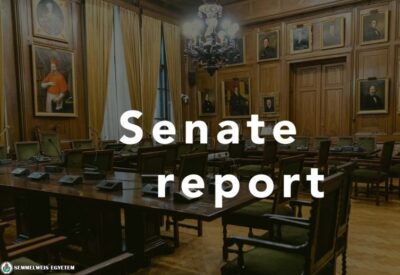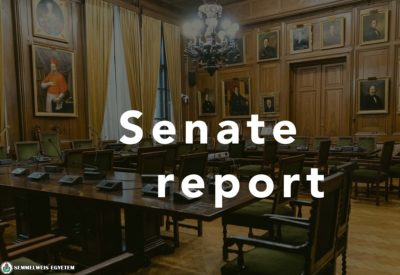At its May meeting, the Senate approved the university’s annual report and public benefit report for 2023 pursuant to the Accounting Act, as well as the amendment of its Remuneration and Benefits Policy. The report has received a clean audit opinion from an independent auditor and has been reviewed by the university’s Public Benefit Supervisory Board and the Supervisory Board of the Foundation for National Health Care and Medical Education, as the university’s maintainer, based on which the Board of Trustees of the university has approved the annual report. The university’s assets increased by more than HUF 30 billion in 2023, from HUF 190 billion to HUF 223 billion, based on the balance sheet total. Out of this, HUF 20 billion growth is related to fixed assets, which is partly due to the state’s free-of-charge asset transfer, i.e. the acquisition of the Merényi site, Chancellor Dr. Lívia Pavlik noted. The university’s 2023 earnings after taxes amounted to HUF 11.5 billion, which, together with the partial use of the university’s development resources from the previous year, enabled nearly HUF 16 billion of further development, as can be seen from the cash flow statement.
The university’s equity increased to HUF 84 billion, within which, in addition to the already mentioned earnings after taxes, the capital reserves increased as a result of the free asset transfer, while the subscribed capital remained unchanged at almost HUF 62 billion.
The Senate decided on the range of conferences and academic events recognized as elective courses in the 2024/25 academic year, as well as on the range of voluntary activities that can replace courses. As regards elective subjects, a decision was taken to expand the curriculum of the course on the Hungarian Startup University Program, which was established by the Hungarian Innovation Agency, and to introduce the English language version of the startup course, starting from the academic year 2024/25.
The board decided on the application for Cardiac Surgery course leader at Asklepios Campus Hamburg (ACH) and the application for head of the Department Group of Gynecology at ACH.
Senators approved the launch of the Master’s Degree in Translational Medicine. The establishment of a special one-year master’s program in translational medicine at the Faculty of Medicine will facilitate international recruitment and international collaborations, expanding Semmelweis University’s international community and enabling intellectual and personal interactions with leading universities across the world.
The board voted in favor of amending the Remuneration and Benefits Policy within the Organizational and Operational Rules. As a result, the scores for academic competition placings; Students’ Scientific Association (TDK) papers and TDK conference placings; rector’s thesis placings; and demonstrator work will be increased.
The senators decided on the establishment, training requirements, and curriculum of the Master’s Degree in Integrated Social Service Management at the Health Services Management Training Center (EMK) of the Faculty of Health and Public Administration (EKK).
The board approved the Curriculum 2.0 of the András Pető Faculty (PAK). Starting from the academic year 2024/25, incoming students will study according to the revised curriculum.
The senators also decided on the appointment of the PAK delegate to the University Ethics Committee, on awarding the titles of professors emeriti, and approved applications for senior positions, associate professors, and scientific advisors.
Anita Szepesi
Translation: Judit Szabados-Dőtsch
Cover by Attila Kovács – Semmelweis University


